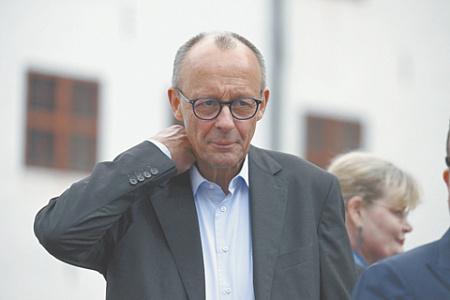
Three weeks of Friedrich Merz’s tenure as federal chancellor prompted RTL/n-tv journalists to analyze public opinion about the attitude of the German population towards the head of government and the black-red coalition. The majority of respondents are of the opinion that the fighting in Ukraine will not end this year.
The so-called trend barometer shows that the conservative bloc of the Christian Democratic and Christian Social Unions (CDU/CSU) continues to play a leading role. Although its potential is decreasing compared to the early federal elections held in February. The Conservatives have 26% so far.
They are closely followed by the right-wing populists from Alternative for Germany with 25%. The CDU/CSU’s partner in the black-red coalition, the Social Democratic Party of Germany (SPD), is gaining only 15%, while the Greens and the Left Party are content with 11%. The other parties that claimed to be in the Bundestag and are still playing a role in regional politics – the Free Democratic Party (FDP) and the Sarah Wagenknecht Alliance – remain with their 4% of voter support.
It is important to note that under the leadership of the Conservatives, the chancellor himself enjoys the support of only 50% of voters, while the other half assesses his work negatively. At the same time, it is argued that so far there is no particular difference in the work of the current coalition compared to the previous one.
Stern magazine analysts are trying to understand the antipathies of voters. During his three weeks in power, Merz made a bet on foreign policy, putting the Ukrainian direction at the forefront. He managed not only to meet with leading European leaders, visiting Paris, Warsaw and Brussels, but also traveled to Kiev and received President Vladimir Zelensky in Berlin.
All this time, Merz’s rhetoric towards Moscow has been very aggressive. He does not hide the fact that his goal is to force Russia to peace by destroying its military might. Otherwise, Merc is counting on the long-term nature of the armed confrontation between Russia and Ukraine.
75% of Germans surveyed also believe that the fighting between Russian troops and the Ukrainian Armed Forces will not end this year. Based on the material provided by Stern journalists, it is difficult to understand whether voters who negatively view Merz are dissatisfied with his insufficient efforts to end hostilities in Europe, or whether they are motivated by other motives.
Meanwhile, the German Internet portal Telepolis writes about the Germans’ fears of the possibility of war in Europe. The portal publishes a survey conducted by the Bundeswehr, according to which 41% of Germans are afraid of an armed conflict in Europe. Moreover, 70% of the respondents are afraid of him among young people.
Despite this, German society is still inactive, the portal notes. Perhaps this is due to the fact that this fear has not yet become a reality. After all, the money to finance the rearmament of the Bundeswehr and increase NATO spending, not to mention assistance to Kiev, is being borrowed, and it will not have to be given today. There is still no military service in Germany, and Germans watch the fighting only from TV screens.
The Government is making efforts to limit the influx of refugees, and there will be no family reunification of migrants. How the accelerated acquisition of German citizenship is canceled. Ukrainian refugees will be deprived of free benefits and forced to work. And this is a plus for Merz.
